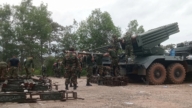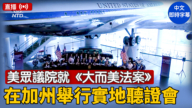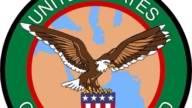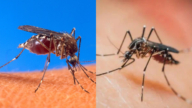【新唐人2011年10月15日讯】中共不断扩张网络作战的举措,再次引发国际争议。美国议员斥责中国的网络间谍战是“厚颜无耻的盗窃”,到了“忍无可忍”地步,这是欧美政界近期对中国网络部队,发出最严厉的一次批评。
中共军方大量利用科技公司和学术界的力量,组织数千支网络民兵组织,不断加强网络作战力量。英国《金融时报》有关网络之战的最后一集:“新的军事竞赛”,谈及中国黑客愈来愈多,也愈来愈专业化。
文章以中国“南昊科技公司”(Nanhao Group)为例,这个看似普通的科技公司,实际它在河北衡水市的5百名职工还有第二份工作,自2006年起,它成为中国人民解放军组建的一支网络民兵部队。
南昊集团副总经理白国良对《金融时报》表示,集团所有30岁以下的员工都是网络民兵,他们定期进行军事交流,并帮助培训解放军军官。当记者问及南昊集团是否从事网络攻击时,白国良回答说:“这不关你的事。”
过去一年里,世界各国政府、知名企业,甚至是军火商,都遭到复杂的网络攻击手段,而这些黑客的源头,绝大部分查证来自中国。
上个星期,美国众议院情报委员会主席罗杰斯(Mike Rogers)公开批评中共的网络攻击,成为当天美国多家媒体的头条。
罗杰斯:“中国以网络窃取美国技术,已到了忍无可忍的地步,我呼吁美国和欧洲、亚洲的盟友一起,迫使北京停止这类活动。”
前一阵子,网络搜索引擎巨头Google和其他网络公司受到黑客攻击的事件,据美国调查人员指控,是由山东的蓝翔职业学校及上海交通大学发动的。
美国全球安全网站(globalsecurity.org)网络作战研究员史密斯(George Smith)对美国之音指出,中国军方招募网络民兵,一是利用这些机构的科研优势协助发动网络攻击,二是利用企业招牌为军方提供掩护,是典型的网络代理攻击模式。
北京方面,则是再次否认支持黑客的攻击行动。不过,根据《人民解放军军事科学院杂志》的一篇文章说,网络部队的任务包括“窃取、改变和消除敌对网站的资料”,目的是搞乱、终止和瘫痪敌对网站。
民间团体“权利运动”发起人胡军认为,中共发动网络战同样是想巩固政权。
民间团体“权利运动”发起人胡军:“就是本身它也害怕见人,它总是躲在阴暗的角落,采取卑劣的手段,对人类文明进步攻击。”
美国和澳大利亚上个月15号罕见的宣布一项行动,声明把“网络领域”列为防御条约之一,无论哪一国受到网络攻击,两国会共同采取行动。更早之前,美国国防部还提出了不排除以军事力量,回击外来的网络攻击,显示出互联网战争,已到了白热化的地步。
新唐人记者朱智善、唐宇、孙宁采访报导。
U.S. Accuses China of Cyber War “Intolerable”
The Chinese Communist Party (CCP) continues to expand
The “Internet War” which has once again
sparked international controversy.
U.S. senators have accused the CCP of blatant theft which has
reached an “Intolerable Level”.
This is the most severe criticism ever by
European and U.S. governments
CCP ‘s extensive military use of technology sectors and
academic influences has set up thousands of cyber militia units.
Financial Times (FT) published series Cyber Warfare:
“The New Arms Race”.
reported that hacking in China is growing,
it is getting more professional and more organised.
FT reported that Nanhao Group in China is
an ordinary technology company,
however, its 500 employees in Hengshui city, Hebei Province,
have a second job. Since 2005 Nanhao has been home to
a cyber militia unit Organised by the People’s Liberation Army.
Bai Guoliang, Nanhao Vice-president said to FT that
all staff under the ago of 30 belong to the unit which
has “regular exchanges”, training PLA officers.
FT journalist asked if the group would carry out cyber attacks,
Bai Guoliang said: “That has nothing to do with you.”
Last year, governments, companies and defense contractors
such as Lockheed Martin have faced sophisticated cyber attacks
said to have originated in China.
Last week, the chairman of the House intelligence committee,
Mike Rogers accused China of “intolerable” “cyber attacks”.
Many media in the U.S. reported this as a headline.
Republican Representative, Mike Rogers said:
“China’s economic espionage has reached an intolerable level
and I believe that the United States and our allies in Europe
and Asia have an obligation to confront Beijing and demand
that a stop is put to this piracy."
After the Internet search giant Google and other internet firms
were attacked and said the source was traced to
Lanxiang Senior Technical School in Shandong Province and
Shanghai Jiao Tong University.
George Smith, senior fellow at Globalsecurity.org told VOA
that China’s creation of cyber militia unit has two purposes:
one is the use of the institutions’ research to help cyber attacks,
second is the use of business’ signs to cover up the attacks.
It is a typical network proxy attack mode.
Beijing once again insists the state doesn’t sponsor hacking.
However, according to an article reported in the magazine of
“the PLA Academy of Military Sciences ”,
the cyber militia’s tasks include “stealing, changing and
erasing data” on enemy networks and their intrusion with
the goal of “deception, jamming, disruption, throttling and paralysis”.
Hu Jun, an activist in China believes that the purpose of the
CCP’s “Internet War” is to consolidate its power.
Hu Jun: “The CCP fears public exposure, the
CCP is always hiding despicable
attacks on human civilization in the dark..
On September 15, U.S. and Australia issued a joint statement
to add cyber warfare to their country’s joint defence treaty,
to counter cyber threats. The two countries will work together
to take action, regardless of which country is being attacked.
U.S. defence said that defending against cyber attacks is
the battlefield of the future.
NTD reporters Zhu Zhishan, Tang Yu and Sun Ning






























